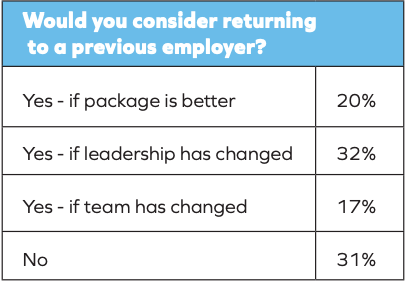Almost three-quarters of Irish professionals (69 per cent) have stated that they are open to returning to their pre-Covid employer, with half admitting that the reasons as to why they left are no longer applicable in today’s market.
According to a recent poll from recruiter Robert Walters (of 2,000 professionals), 43 per cent of workers who had left their job after lockdown did so for better pay, with a further 37 per cent leaving for a better workplace culture or more purpose/fulfilment in their role. Fast-forward two years later, and 45 per cent of professionals admit that their current employer is no longer meeting their needs, with a third stating the cost-of-living crisis and hybrid-working fatigue (25 per cent) has changed how they feel about their most recent employment situation.
Suzanne Feeney, Country Manager at Robert Walters Ireland, commented: “The post-pandemic bounce-back saw record numbers of employees leave their job in what was billed as ‘The Great Resignation’. However, our research indicates toward first signs of ‘The Great Regret’, with an overwhelming number of professionals stating that they would be willing to return to their pre-Covid employer a mere 18 months after leaving.
“Across 2021, we saw record pay rises offered to professionals, with promises of an flexible and hybrid culture. Come 2023, and these pay rises now pale in comparison to the rising cost of living and inflation, with those new starters who were offered inflated salaries being much less likely to have received a pay increase this year.
“It appears that workers are realising that the grass may not have been greener after all.” Eighty per cent of those surveyed admitted to staying in some form of contact with a previous manager, with almost a third stating that this was for the primary purpose of keeping the door open for future job opportunities (31 per cent).
In fact, a quarter of professionals have admitted to reaching out to a previous employer in the past year regarding job opportunities, with a further 10 per cent stating that they have not done it yet, but intend to this year.
Only one-in-five employees have completely shut the door on previous employers, with 20 per cent stating that they have zero contact with their previous manager.
Whilst the sentiment may be there from professionals, it seems the same cannot be said for managers — in fact, 46 per cent admitted to being hesitant in allowing an old employee back into the team, with just a fifth stating that they would consider it if they had been an ‘exceptional employee’.
Ms Feeney added: “I’m afraid managers and employers need to swallow their pride here. In what continues to be one of the most candidateshort markets we have seen in decades, the idea that a pool of talent is open to joining your company should be music to your ears.
“Not only that, but this is talent that can hit the ground running — they have already been inducted into your business, they will be familiar with processes, and have a previous vested interest in the brand, all qualities which can take years to instil.
“In light of this research, not only should companies who are looking to hire consider re-engaging with alumni, but they should also look to train managers on holding a positive exit process, as ‘boomerang employees’ could well be a solution to your skills shortage.








